Python
TIP
Only the python language for Allure is maintained. If you want to know about other programming languages for Allure, see the document for detail.
Pytest
Installation
Pytest is available for installation from the PyPI, therefore installation with pip is recommended. To install the latest version, execute from the command line:
$ pip install allure-pytest$ pip install allure-pytestThat will install allure-pytest and allure-python-commons packages to produce report data compatible with Allure 2. If you are using a previous version of adapter for the first generation of Allure reports then you will need to uninstall it first.
Usage
To enable Allure listener to collect results during the test execution simply add --alluredir option and provide path to the folder where results should be stored. E.g.:
$ pytest --alluredir=/tmp/my_allure_results$ pytest --alluredir=/tmp/my_allure_resultsTo see the actual report after your tests have finished, you need to use Allure commandline utility to generate report from the results.
$ allure serve /tmp/my_allure_results$ allure serve /tmp/my_allure_resultsThis command will show you generated report in your default browser.
Basic Reporting
Your can see all default pytest statuses in the Allure report: only tests that were not succeeded due to one of the assertion errors will be marked as failed, any other exception will cause a test to have a broken status.
import pytest
def test_success():
"""this test succeeds"""
assert True
def test_failure():
"""this test fails"""
assert False
def test_skip():
"""this test is skipped"""
pytest.skip('for a reason!')
def test_broken():
raise Exception('oops')import pytest
def test_success():
"""this test succeeds"""
assert True
def test_failure():
"""this test fails"""
assert False
def test_skip():
"""this test is skipped"""
pytest.skip('for a reason!')
def test_broken():
raise Exception('oops')Supported Pytest features
Some of the common Pytest features that the Allure report supports include xfails, fixtures and finalizers, marks, conditional skips and parametrization.
Xfail
This is pytest way of marking expected failures: (Pytest docs)
@pytest.mark.xfail(condition=lambda: True, reason='this test is expecting failure')
def test_xfail_expected_failure():
"""this test is an xfail that will be marked as expected failure"""
assert False
@pytest.mark.xfail(condition=lambda: True, reason='this test is expecting failure')
def test_xfail_unexpected_pass():
"""this test is an xfail that will be marked as unexpected success"""
assert True@pytest.mark.xfail(condition=lambda: True, reason='this test is expecting failure')
def test_xfail_expected_failure():
"""this test is an xfail that will be marked as expected failure"""
assert False
@pytest.mark.xfail(condition=lambda: True, reason='this test is expecting failure')
def test_xfail_unexpected_pass():
"""this test is an xfail that will be marked as unexpected success"""
assert TrueWhich results in test being skipped and marked with a special tag when it is expected to fail.
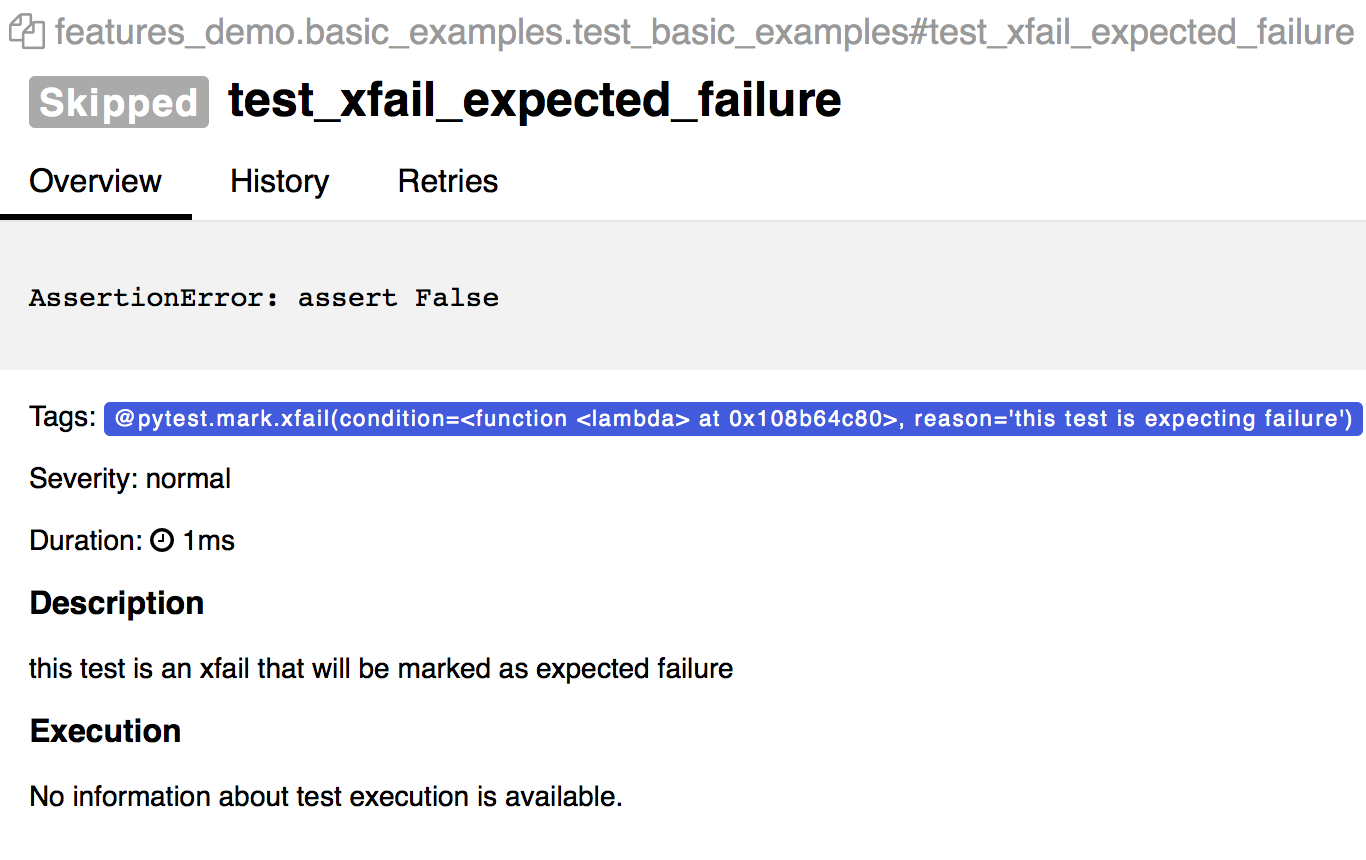
And special marking in description and a special tag when it unexpectedly passed.
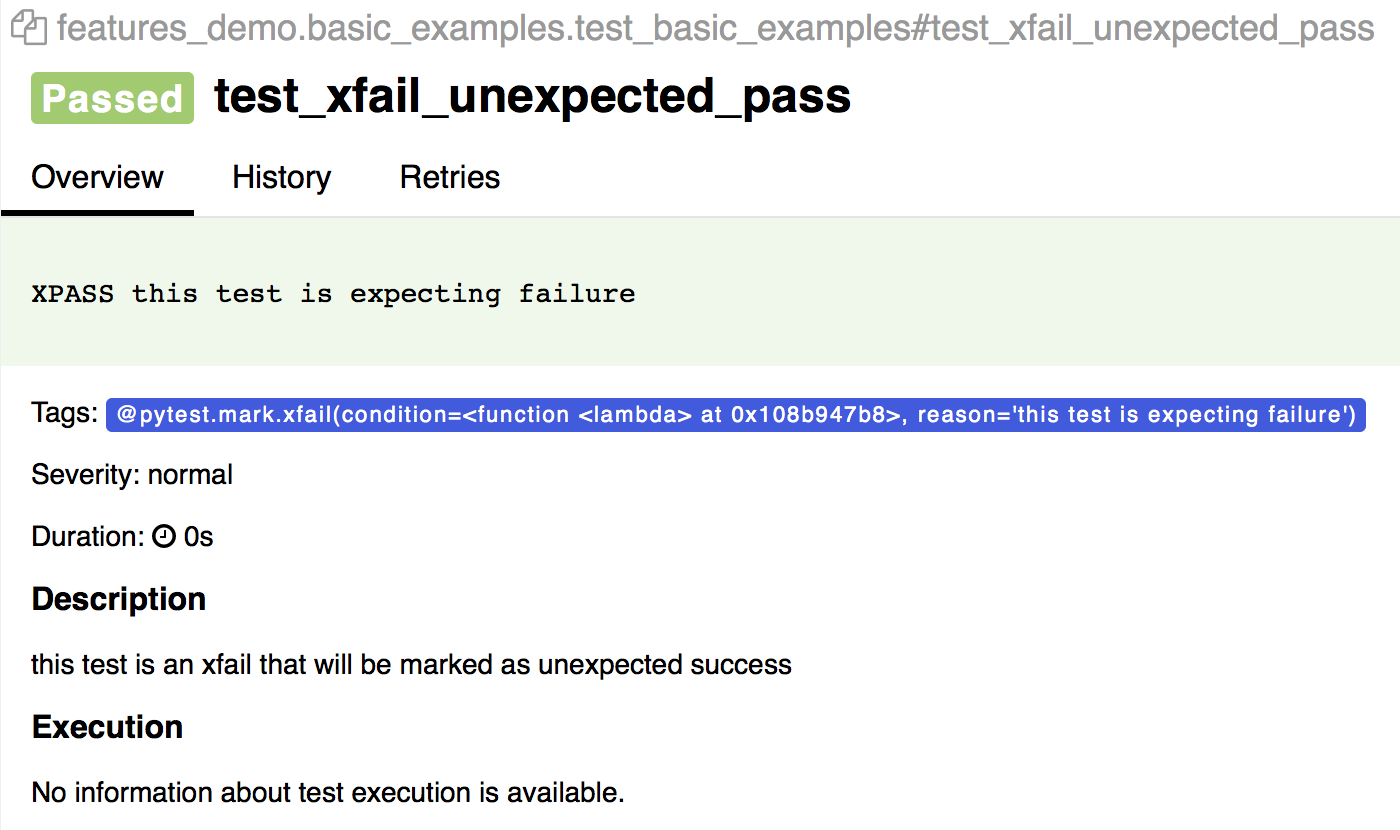
Conditional mark
In Pytest you can conditionally mark a test to not be executed under some specific conditions (Pytest docs):
@pytest.mark.skipif('2 + 2 != 5', reason='This test is skipped by a triggered condition in @pytest.mark.skipif')
def test_skip_by_triggered_condition():
pass@pytest.mark.skipif('2 + 2 != 5', reason='This test is skipped by a triggered condition in @pytest.mark.skipif')
def test_skip_by_triggered_condition():
passWhen condition is evaluated to true, test receives a 'Skipped' status in report, a tag and a description from the decorator.
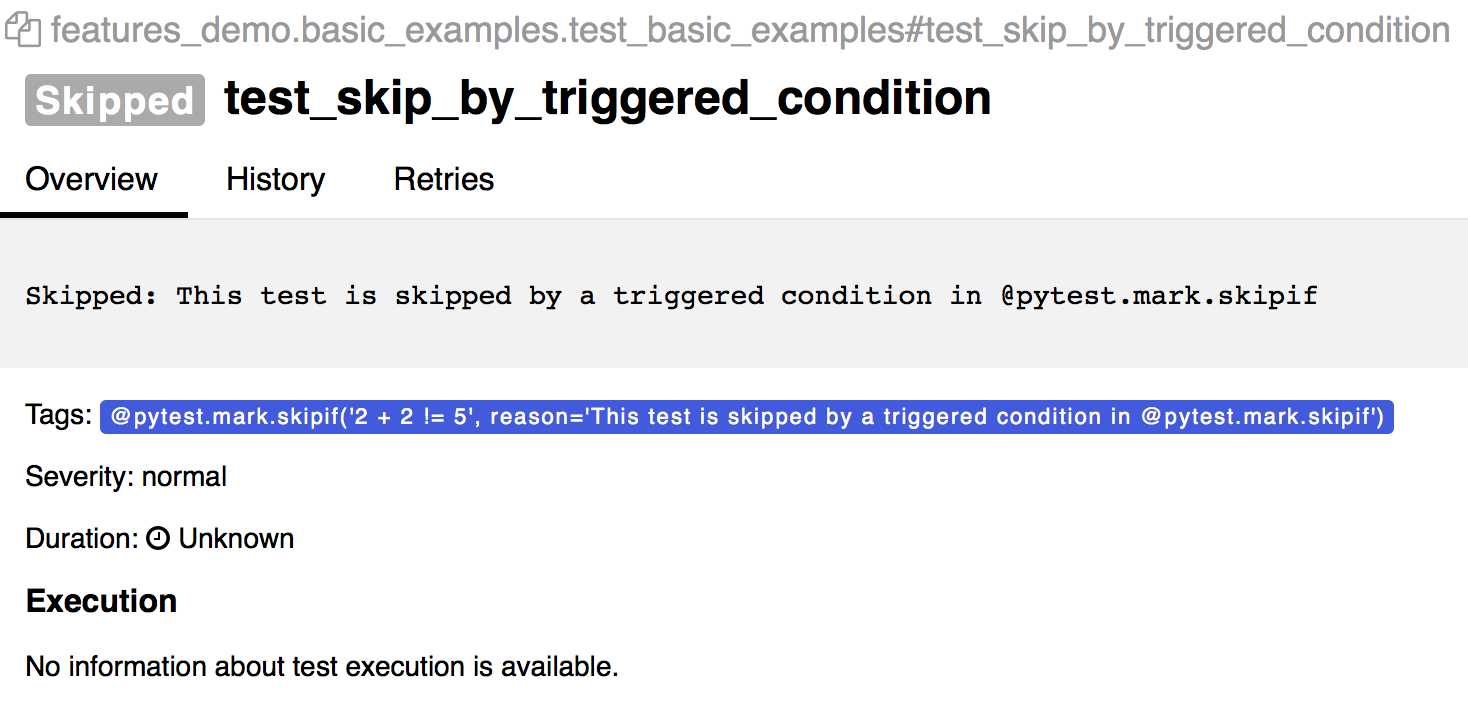
Fixtures and Finalizers
Fixtures and finalizers are the utility functions that will be invoked by Pytest before your test starts and after your test ends respectively. Allure tracks invocations of every fixture and shows in full details what methods with what arguments were invoked, preserving the correct sequence of the calls that were made. (Pytest docs)
You don’t need to mark your fixtures to make them visible in the report, they will be detected automatically for different skopes.
@pytest.fixture(params=[True, False], ids=['param_true', 'param_false'])
def function_scope_fixture_with_finalizer(request):
if request.param:
print('True')
else:
print('False')
def function_scope_finalizer():
function_scope_step()
request.addfinalizer(function_scope_finalizer)
@pytest.fixture(scope='class')
def class_scope_fixture_with_finalizer(request):
def class_finalizer_fixture():
class_scope_step()
request.addfinalizer(class_finalizer_fixture)
@pytest.fixture(scope='module')
def module_scope_fixture_with_finalizer(request):
def module_finalizer_fixture():
module_scope_step()
request.addfinalizer(module_finalizer_fixture)
@pytest.fixture(scope='session')
def session_scope_fixture_with_finalizer(request):
def session_finalizer_fixture():
session_scope_step()
request.addfinalizer(session_finalizer_fixture)
class TestClass(object):
def test_with_scoped_finalizers(self,
function_scope_fixture_with_finalizer,
class_scope_fixture_with_finalizer,
module_scope_fixture_with_finalizer,
session_scope_fixture_with_finalizer):
step_inside_test_body()@pytest.fixture(params=[True, False], ids=['param_true', 'param_false'])
def function_scope_fixture_with_finalizer(request):
if request.param:
print('True')
else:
print('False')
def function_scope_finalizer():
function_scope_step()
request.addfinalizer(function_scope_finalizer)
@pytest.fixture(scope='class')
def class_scope_fixture_with_finalizer(request):
def class_finalizer_fixture():
class_scope_step()
request.addfinalizer(class_finalizer_fixture)
@pytest.fixture(scope='module')
def module_scope_fixture_with_finalizer(request):
def module_finalizer_fixture():
module_scope_step()
request.addfinalizer(module_finalizer_fixture)
@pytest.fixture(scope='session')
def session_scope_fixture_with_finalizer(request):
def session_finalizer_fixture():
session_scope_step()
request.addfinalizer(session_finalizer_fixture)
class TestClass(object):
def test_with_scoped_finalizers(self,
function_scope_fixture_with_finalizer,
class_scope_fixture_with_finalizer,
module_scope_fixture_with_finalizer,
session_scope_fixture_with_finalizer):
step_inside_test_body()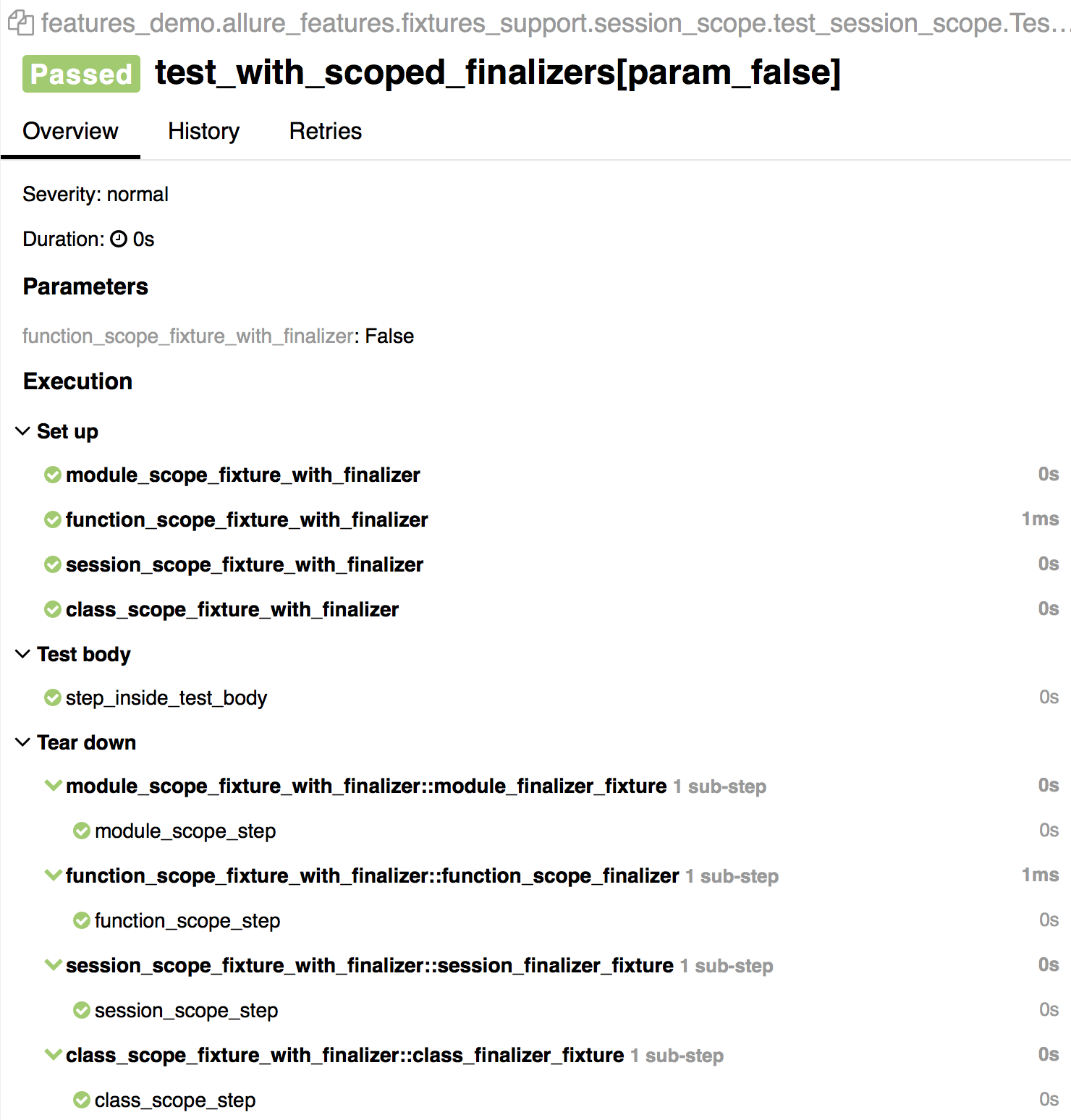
Depending on an outcome of a fixture execution, test that is dependent on it may receive a different status. Exception in the fixture would make all dependent tests broken, pytest.skip() call would make all dependent test skipped.
import pytest
@pytest.fixture
def skip_fixture():
pytest.skip()
@pytest.fixture
def fail_fixture():
assert False
@pytest.fixture
def broken_fixture():
raise Exception("Sorry, it's broken.")
def test_with_pytest_skip_in_the_fixture(skip_fixture):
pass
def test_with_failure_in_the_fixture(fail_fixture):
pass
def test_with_broken_fixture(broken_fixture):
passimport pytest
@pytest.fixture
def skip_fixture():
pytest.skip()
@pytest.fixture
def fail_fixture():
assert False
@pytest.fixture
def broken_fixture():
raise Exception("Sorry, it's broken.")
def test_with_pytest_skip_in_the_fixture(skip_fixture):
pass
def test_with_failure_in_the_fixture(fail_fixture):
pass
def test_with_broken_fixture(broken_fixture):
pass
Parametrization
You can generate many test cases from the sets of input parameters using @pytest.mark.parametrize. (Pytest docs)
All argument names and values will be captured in the report, optionally argument names will be replaced with provided string descriptions in the ids kwarg.
import allure
import pytest
@allure.step
def simple_step(step_param1, step_param2 = None):
pass
@pytest.mark.parametrize('param1', [True, False], ids=['id explaining value 1', 'id explaining value 2'])
def test_parameterize_with_id(param1):
simple_step(param1)
@pytest.mark.parametrize('param1', [True, False])
@pytest.mark.parametrize('param2', ['value 1', 'value 2'])
def test_parametrize_with_two_parameters(param1, param2):
simple_step(param1, param2)
@pytest.mark.parametrize('param1', [True], ids=['boolean parameter id'])
@pytest.mark.parametrize('param2', ['value 1', 'value 2'])
@pytest.mark.parametrize('param3', [1])
def test_parameterize_with_uneven_value_sets(param1, param2, param3):
simple_step(param1, param3)
simple_step(param2)import allure
import pytest
@allure.step
def simple_step(step_param1, step_param2 = None):
pass
@pytest.mark.parametrize('param1', [True, False], ids=['id explaining value 1', 'id explaining value 2'])
def test_parameterize_with_id(param1):
simple_step(param1)
@pytest.mark.parametrize('param1', [True, False])
@pytest.mark.parametrize('param2', ['value 1', 'value 2'])
def test_parametrize_with_two_parameters(param1, param2):
simple_step(param1, param2)
@pytest.mark.parametrize('param1', [True], ids=['boolean parameter id'])
@pytest.mark.parametrize('param2', ['value 1', 'value 2'])
@pytest.mark.parametrize('param3', [1])
def test_parameterize_with_uneven_value_sets(param1, param2, param3):
simple_step(param1, param3)
simple_step(param2)Example of captured test invocations with different sets of named and unnamed parameters.
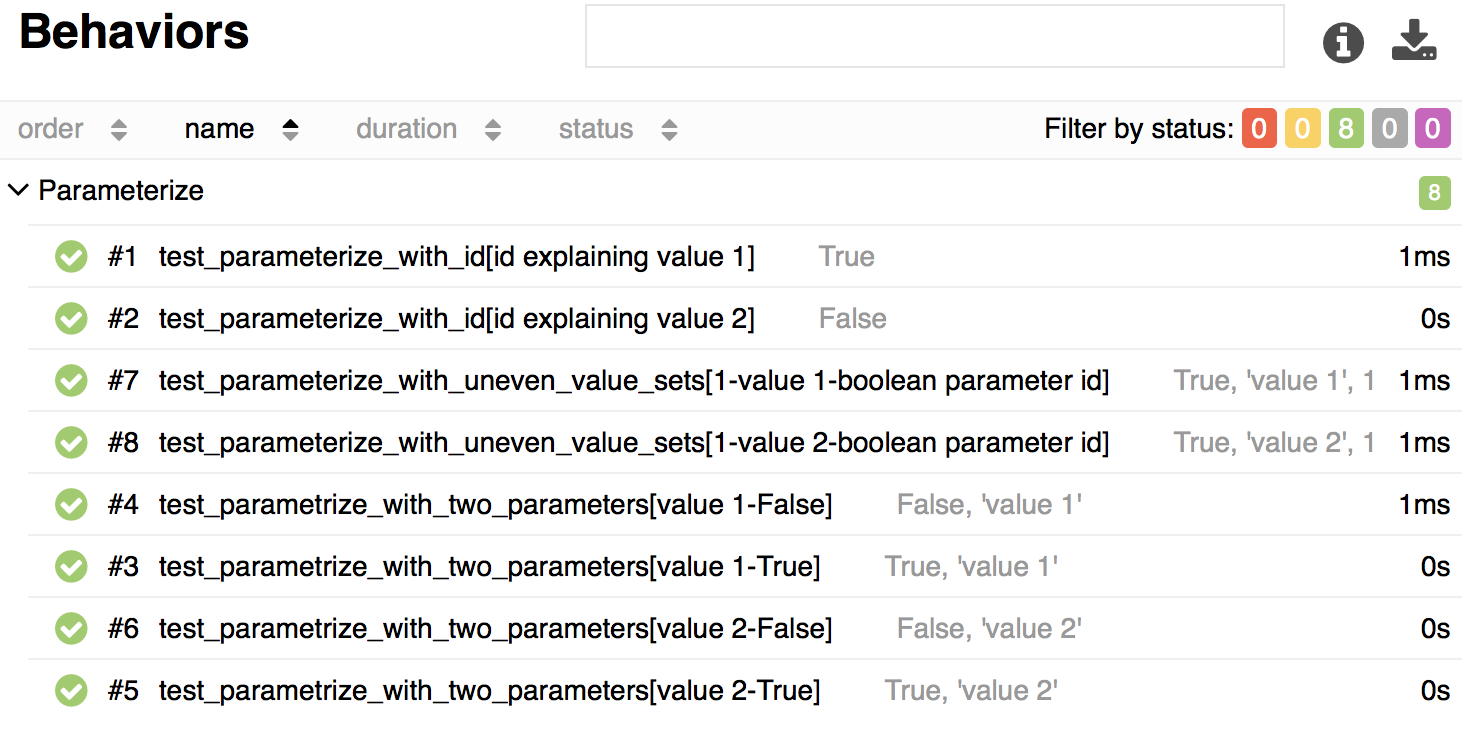
Details of test execution for a parameterized test with a named parameter.
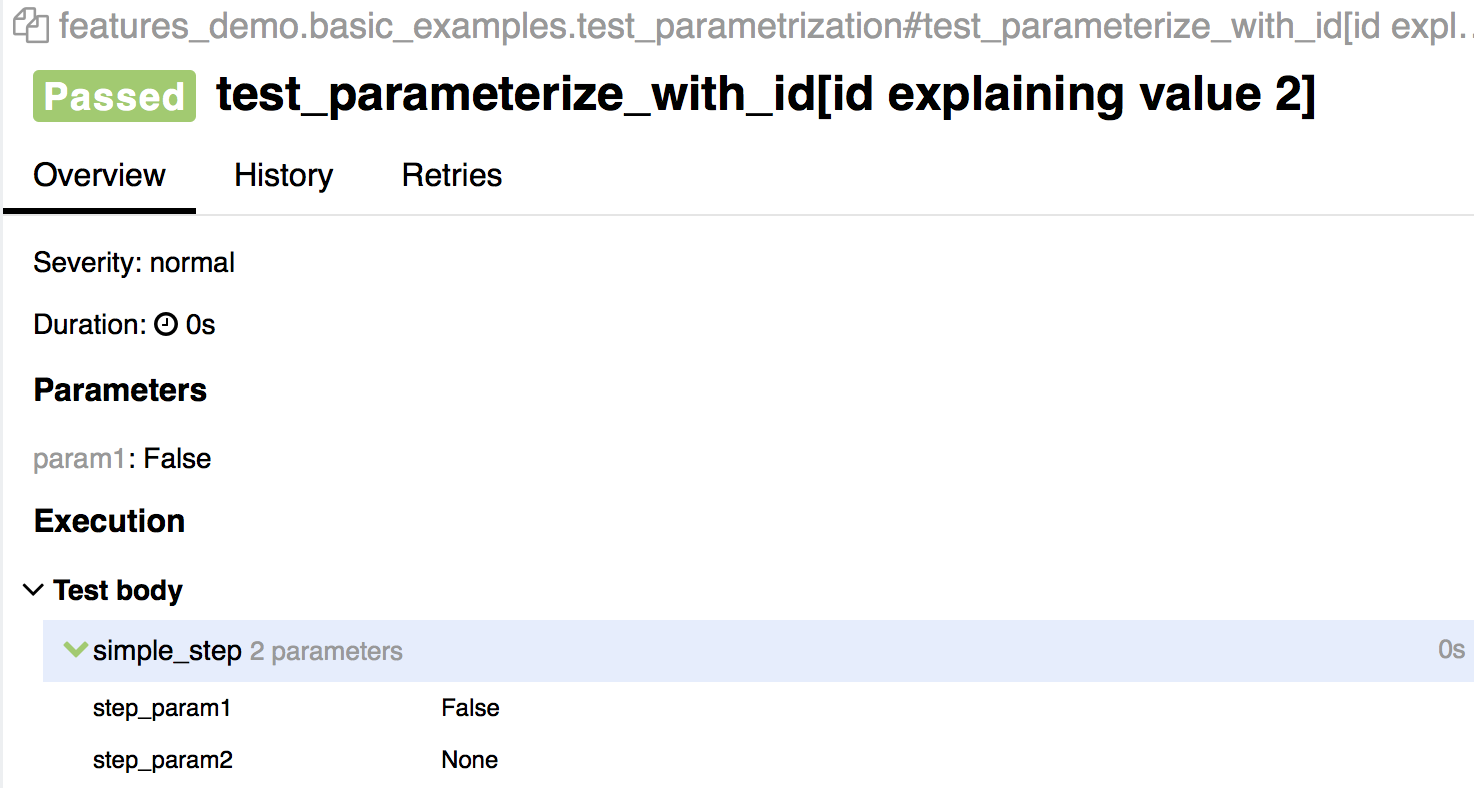
Allure Features
Allure currently supports almost every available feature except for environment with Pytest.
Steps
The first and probably most important aspect of the Allure report is that it allows to get a very detailed step-by-step representation of every test invocation. This is made possible with @allure.step decorator that adds invocation of the annotated method or function with provided arguments to the report.
Methods annotated with @step can be stored aside from your tests and just imported when needed. Step methods can have an arbitrarily deep nested structure.
import allure
import pytest
from .steps import imported_step
@allure.step
def passing_step():
pass
@allure.step
def step_with_nested_steps():
nested_step()
@allure.step
def nested_step():
nested_step_with_arguments(1, 'abc')
@allure.step
def nested_step_with_arguments(arg1, arg2):
pass
def test_with_imported_step():
passing_step()
imported_step()
def test_with_nested_steps():
passing_step()
step_with_nested_steps()import allure
import pytest
from .steps import imported_step
@allure.step
def passing_step():
pass
@allure.step
def step_with_nested_steps():
nested_step()
@allure.step
def nested_step():
nested_step_with_arguments(1, 'abc')
@allure.step
def nested_step_with_arguments(arg1, arg2):
pass
def test_with_imported_step():
passing_step()
imported_step()
def test_with_nested_steps():
passing_step()
step_with_nested_steps()Status of every step is shown in a small icon on the right from the name. Nested steps are organized in a tree-like collapsible structure.
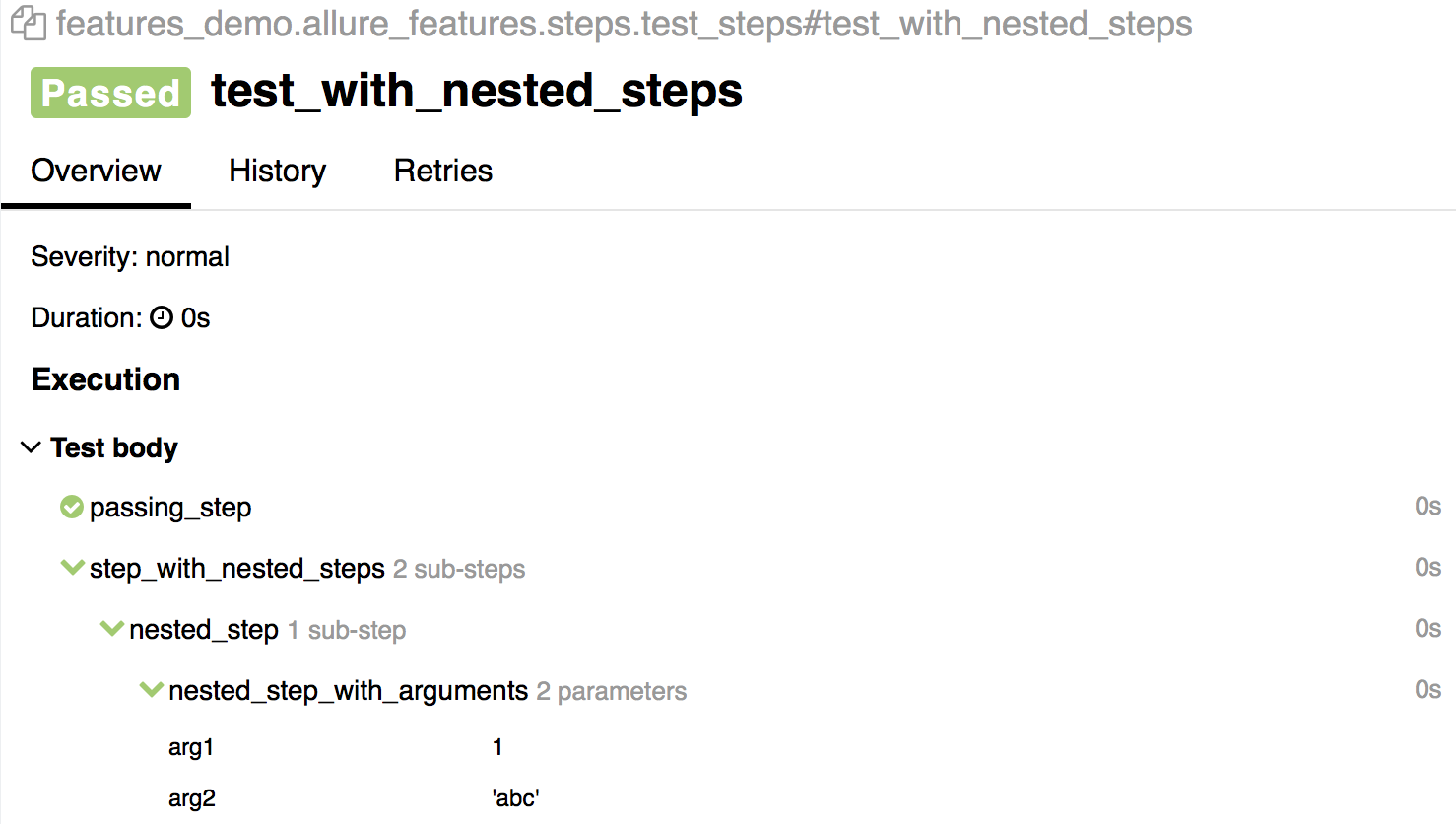
Steps can have a description line that supports placeholders for passed positional and keyword arguments. Default parameters of the keyword arguments will be captured as well.
import allure
@allure.step('Step with placeholders in the title, positional: "{0}", keyword: "{key}"')
def step_with_title_placeholders(arg1, key=None):
pass
def test_steps_with_placeholders():
step_with_title_placeholders(1, key='something')
step_with_title_placeholders(2)
step_with_title_placeholders(3, 'anything')import allure
@allure.step('Step with placeholders in the title, positional: "{0}", keyword: "{key}"')
def step_with_title_placeholders(arg1, key=None):
pass
def test_steps_with_placeholders():
step_with_title_placeholders(1, key='something')
step_with_title_placeholders(2)
step_with_title_placeholders(3, 'anything')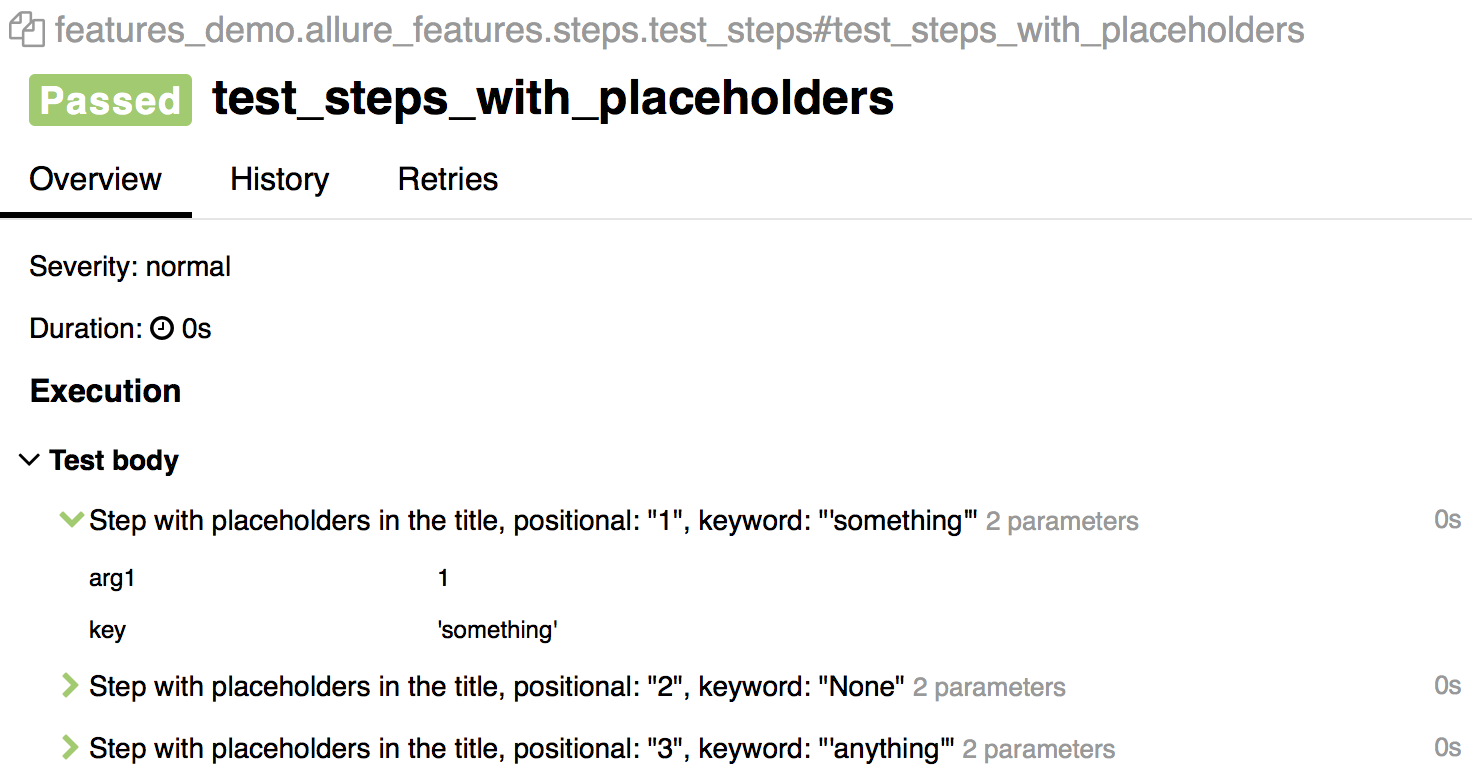
Steps are supported in fixtures as well. Here is an example of a test using a fixture defined in conftest.py module (such fixtures will be resolved by Pytest even when not directly imported):
# conftest.py
import allure
import pytest
@allure.step('step in conftest.py')
def conftest_step():
pass
@pytest.fixture
def fixture_with_conftest_step():
conftest_step()# conftest.py
import allure
import pytest
@allure.step('step in conftest.py')
def conftest_step():
pass
@pytest.fixture
def fixture_with_conftest_step():
conftest_step()import allure
from .steps import imported_step
@allure.step
def passing_step():
pass
def test_with_step_in_fixture_from_conftest(fixture_with_conftest_step):
passing_step()import allure
from .steps import imported_step
@allure.step
def passing_step():
pass
def test_with_step_in_fixture_from_conftest(fixture_with_conftest_step):
passing_step()Steps in fixtures are shown in separate trees for setup and teardown.
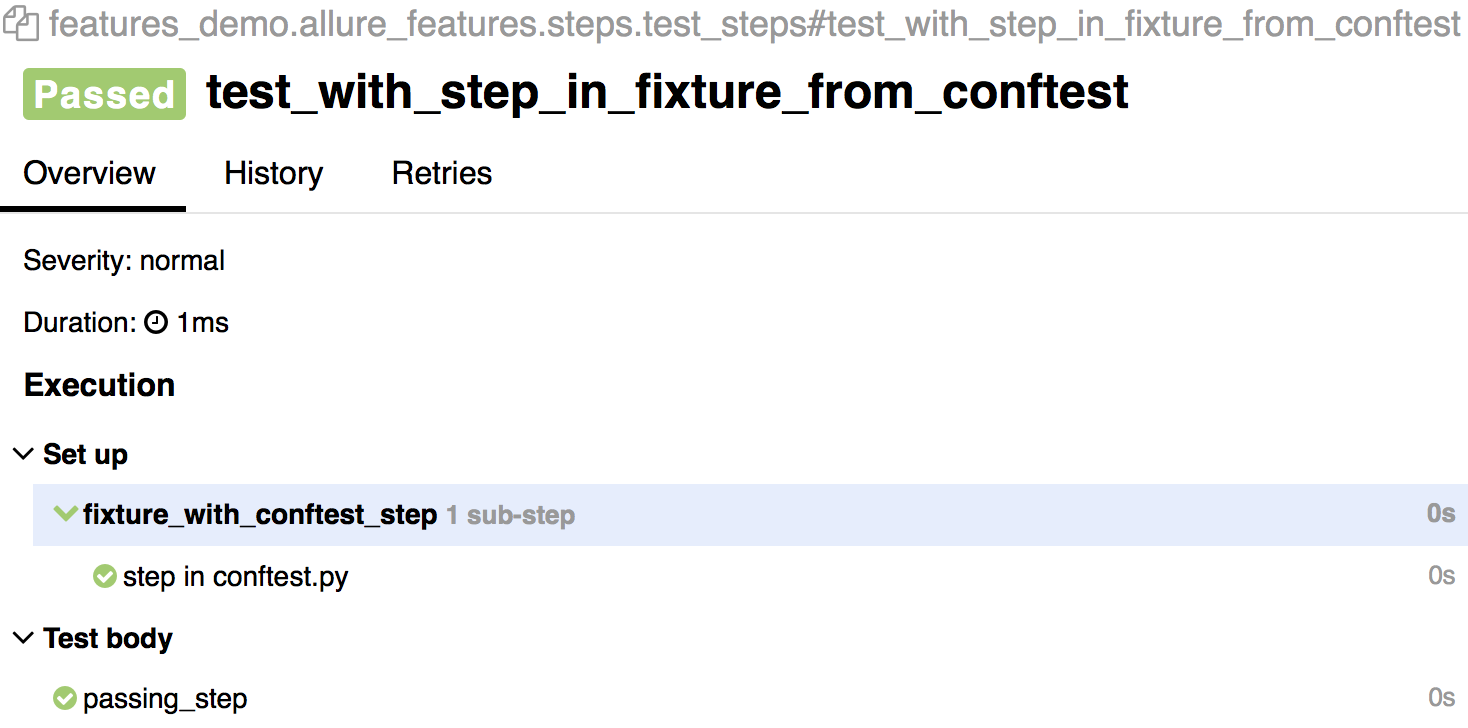
Attachments
Reports can display many different types of provided attachments that can complement a test, step or fixture result. Attachments can be created either with invocation of allure.attach(body, name, attachment_type, extension):
body- raw content to be written into the file.name- a string with name of the fileattachment_type- one of theallure.attachment_typevaluesextension- is provided will be used as an extension for the created file.
or allure.attach.file(source, name, attachment_type, extension):
source- a string containing path to the file.
(other arguments are the same)
import allure
import pytest
@pytest.fixture
def attach_file_in_module_scope_fixture_with_finalizer(request):
allure.attach('A text attacment in module scope fixture', 'blah blah blah', allure.attachment_type.TEXT)
def finalizer_module_scope_fixture():
allure.attach('A text attacment in module scope finalizer', 'blah blah blah blah',
allure.attachment_type.TEXT)
request.addfinalizer(finalizer_module_scope_fixture)
def test_with_attacments_in_fixture_and_finalizer(attach_file_in_module_scope_finalizer):
pass
def test_multiple_attachments():
allure.attach.file('./data/totally_open_source_kitten.png', attachment_type=allure.attachment_type.PNG)
allure.attach('<head></head><body> a page </body>', 'Attach with HTML type', allure.attachment_type.HTML)import allure
import pytest
@pytest.fixture
def attach_file_in_module_scope_fixture_with_finalizer(request):
allure.attach('A text attacment in module scope fixture', 'blah blah blah', allure.attachment_type.TEXT)
def finalizer_module_scope_fixture():
allure.attach('A text attacment in module scope finalizer', 'blah blah blah blah',
allure.attachment_type.TEXT)
request.addfinalizer(finalizer_module_scope_fixture)
def test_with_attacments_in_fixture_and_finalizer(attach_file_in_module_scope_finalizer):
pass
def test_multiple_attachments():
allure.attach.file('./data/totally_open_source_kitten.png', attachment_type=allure.attachment_type.PNG)
allure.attach('<head></head><body> a page </body>', 'Attach with HTML type', allure.attachment_type.HTML)Attachments are shown in the context of a test entity they belong to. Attachments of HTML type are rendered and displayed on the report page. This is a convenient way to provide some customization for your own representation of a test result.
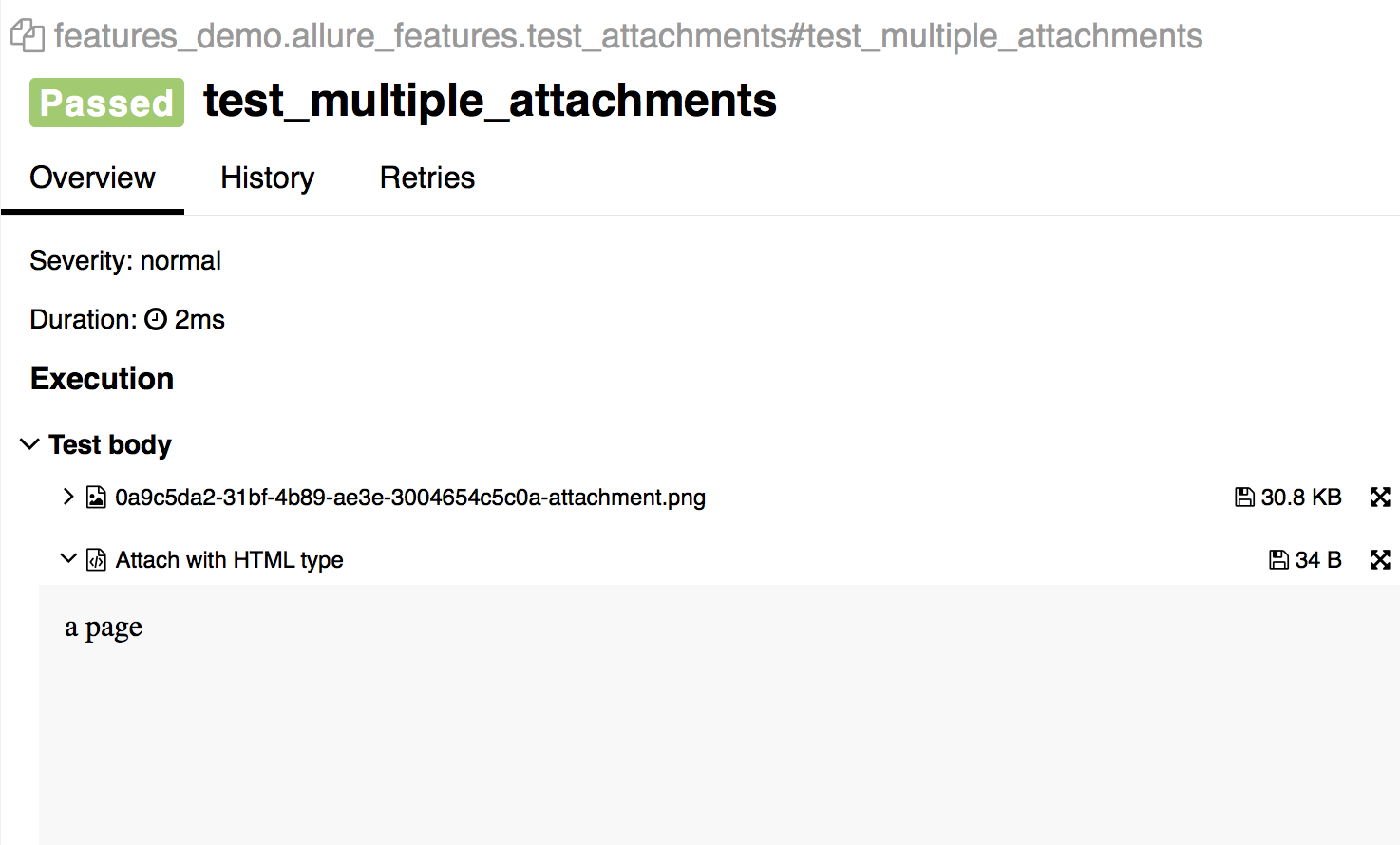
Descriptions
You can add a detailed description for tests to provide as much context to the report reader as you want. This can be done in several ways: you can add a @allure.description decorator providing a description string or you can use @allure.description_html to provide some HTML to be rendered in the 'Description' section of a test case. Alternatively description will be simply picked up from the docstring of a test method.
import allure
@allure.description_html("""
<h1>Test with some complicated html description</h1>
<table style="width:100%">
<tr>
<th>Firstname</th>
<th>Lastname</th>
<th>Age</th>
</tr>
<tr align="center">
<td>William</td>
<td>Smith</td>
<td>50</td>
</tr>
<tr align="center">
<td>Vasya</td>
<td>Jackson</td>
<td>94</td>
</tr>
</table>
""")
def test_html_description():
assert True
@allure.description("""
Multiline test description.
That comes from the allure.description decorator.
Nothing special about it.
""")
def test_description_from_decorator():
assert 42 == int(6 * 7)
def test_unicode_in_docstring_description():
"""Unicode in description.
Этот тест проверяет юникод.
你好伙计.
"""
assert 42 == int(6 * 7)import allure
@allure.description_html("""
<h1>Test with some complicated html description</h1>
<table style="width:100%">
<tr>
<th>Firstname</th>
<th>Lastname</th>
<th>Age</th>
</tr>
<tr align="center">
<td>William</td>
<td>Smith</td>
<td>50</td>
</tr>
<tr align="center">
<td>Vasya</td>
<td>Jackson</td>
<td>94</td>
</tr>
</table>
""")
def test_html_description():
assert True
@allure.description("""
Multiline test description.
That comes from the allure.description decorator.
Nothing special about it.
""")
def test_description_from_decorator():
assert 42 == int(6 * 7)
def test_unicode_in_docstring_description():
"""Unicode in description.
Этот тест проверяет юникод.
你好伙计.
"""
assert 42 == int(6 * 7)Description supports unicode strings:
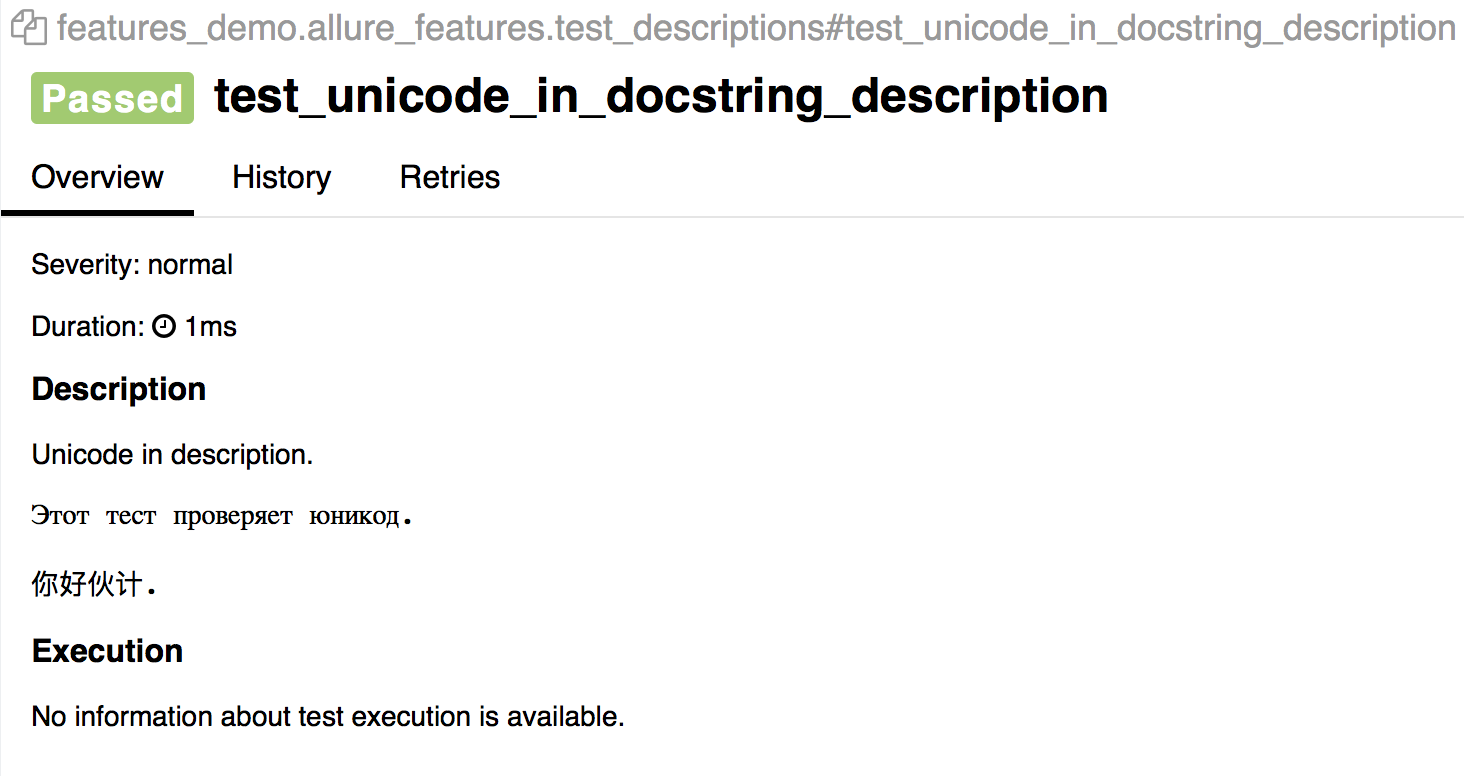
Rendered HTML from description_html:
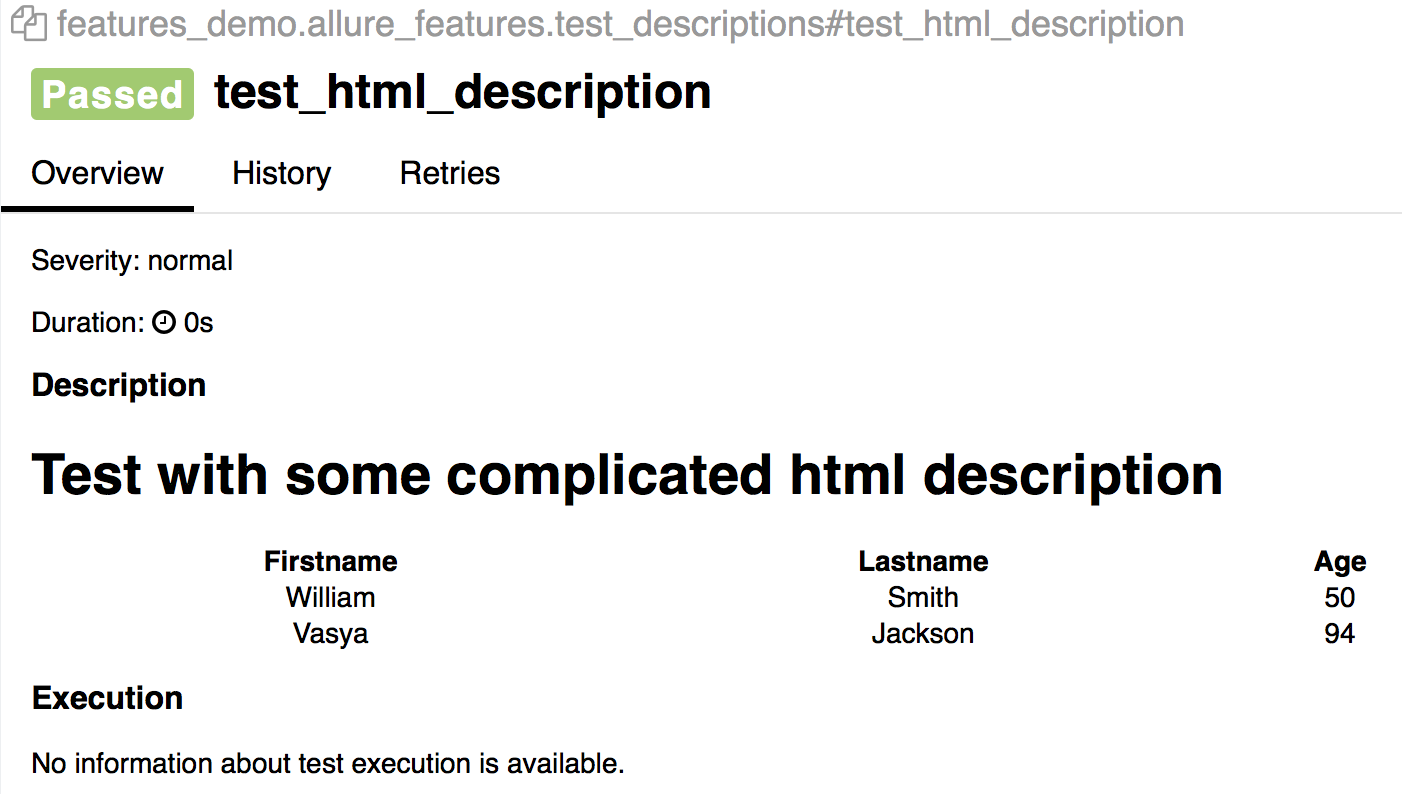
Also descriptions can be dynamically updated from within test body using allure.dynamic.description.
import allure
@allure.description("""
This description will be replaced at the end of the test.
""")
def test_dynamic_description():
assert 42 == int(6 * 7)
allure.dynamic.description('A final description.')import allure
@allure.description("""
This description will be replaced at the end of the test.
""")
def test_dynamic_description():
assert 42 == int(6 * 7)
allure.dynamic.description('A final description.')Titles
Test titles can be made more readable with special @allure.title decorator. Titles support placeholders for arguments and support dynamic replacement.
import allure
import pytest
@allure.title("This test has a custom title")
def test_with_a_title():
assert 2 + 2 == 4
@allure.title("This test has a custom title with unicode: Привет!")
def test_with_unicode_title():
assert 3 + 3 == 6
@allure.title("Parameterized test title: adding {param1} with {param2}")
@pytest.mark.parametrize('param1,param2,expected', [
(2, 2, 4),
(1, 2, 5)
])
def test_with_parameterized_title(param1, param2, expected):
assert param1 + param2 == expected
@allure.title("This title will be replaced in a test body")
def test_with_dynamic_title():
assert 2 + 2 == 4
allure.dynamic.title('After a successful test finish, the title was replaced with this line.')import allure
import pytest
@allure.title("This test has a custom title")
def test_with_a_title():
assert 2 + 2 == 4
@allure.title("This test has a custom title with unicode: Привет!")
def test_with_unicode_title():
assert 3 + 3 == 6
@allure.title("Parameterized test title: adding {param1} with {param2}")
@pytest.mark.parametrize('param1,param2,expected', [
(2, 2, 4),
(1, 2, 5)
])
def test_with_parameterized_title(param1, param2, expected):
assert param1 + param2 == expected
@allure.title("This title will be replaced in a test body")
def test_with_dynamic_title():
assert 2 + 2 == 4
allure.dynamic.title('After a successful test finish, the title was replaced with this line.')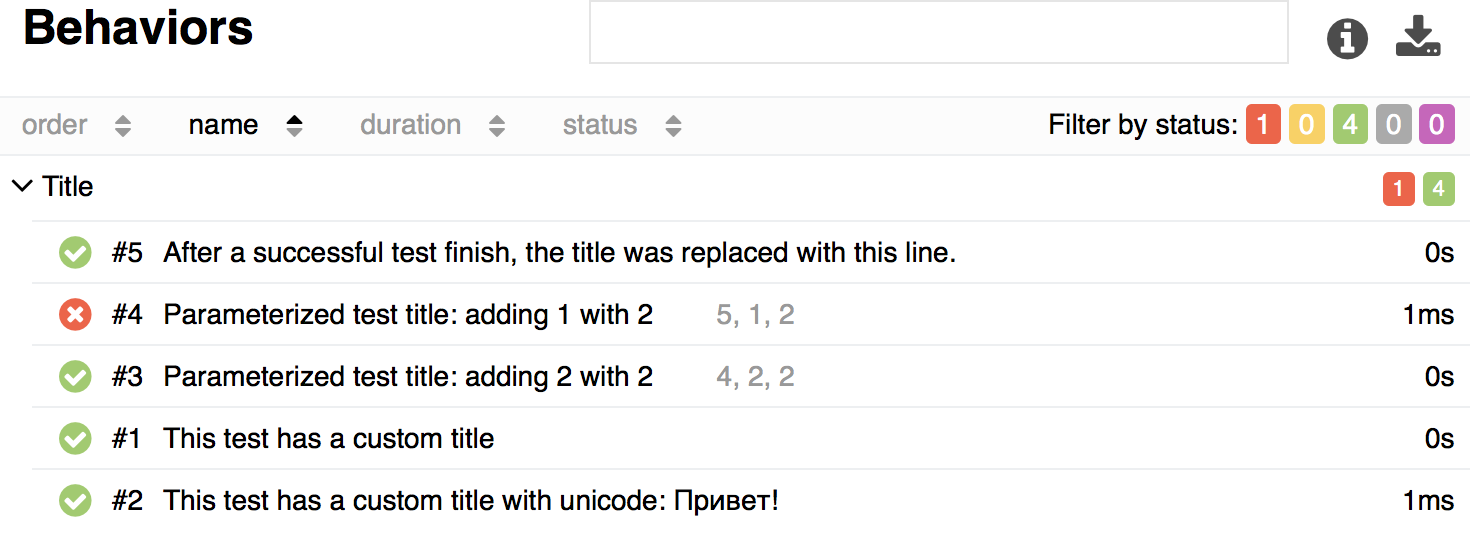
Links
To integrate report with a bugtracker or test management system Allure has @allure.link, @allure.issue and @allure.testcase descriptors.
import allure
TEST_CASE_LINK = 'https://github.com/qameta/allure-integrations/issues/8#issuecomment-268313637'
@allure.link('https://www.youtube.com/watch?v=4YYzUTYZRMU')
def test_with_link():
pass
@allure.link('https://www.youtube.com/watch?v=Su5p2TqZxKU', name='Click me')
def test_with_named_link():
pass
@allure.issue('140', 'Pytest-flaky test retries shows like test steps')
def test_with_issue_link():
pass
@allure.testcase(TEST_CASE_LINK, 'Test case title')
def test_with_testcase_link():
passimport allure
TEST_CASE_LINK = 'https://github.com/qameta/allure-integrations/issues/8#issuecomment-268313637'
@allure.link('https://www.youtube.com/watch?v=4YYzUTYZRMU')
def test_with_link():
pass
@allure.link('https://www.youtube.com/watch?v=Su5p2TqZxKU', name='Click me')
def test_with_named_link():
pass
@allure.issue('140', 'Pytest-flaky test retries shows like test steps')
def test_with_issue_link():
pass
@allure.testcase(TEST_CASE_LINK, 'Test case title')
def test_with_testcase_link():
pass@allure.link will provide a clickable link to provided url in 'Links' section:
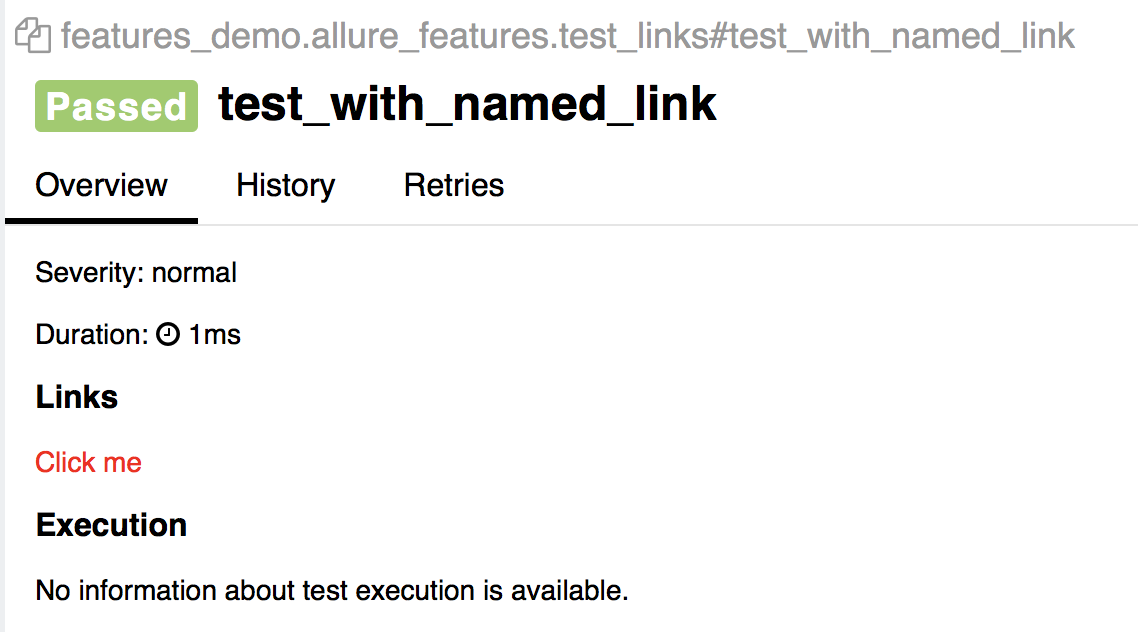
@allure.issue will provide a link with a small bug icon. This descriptor takes test case id as the input parameter to use it with provided link template for issue link type. Link templates are specified in --allure-link-pattern configuration option for Pytest. Link templates and types have to be specified using a colon:
$ pytest directory_with_tests/ --alluredir=/tmp/my_allure_report \
--allure-link-pattern=issue:http://www.mytesttracker.com/issue/{}$ pytest directory_with_tests/ --alluredir=/tmp/my_allure_report \
--allure-link-pattern=issue:http://www.mytesttracker.com/issue/{}Template keywords are issue, link and test_case to provide a template for the corresponding type of link.
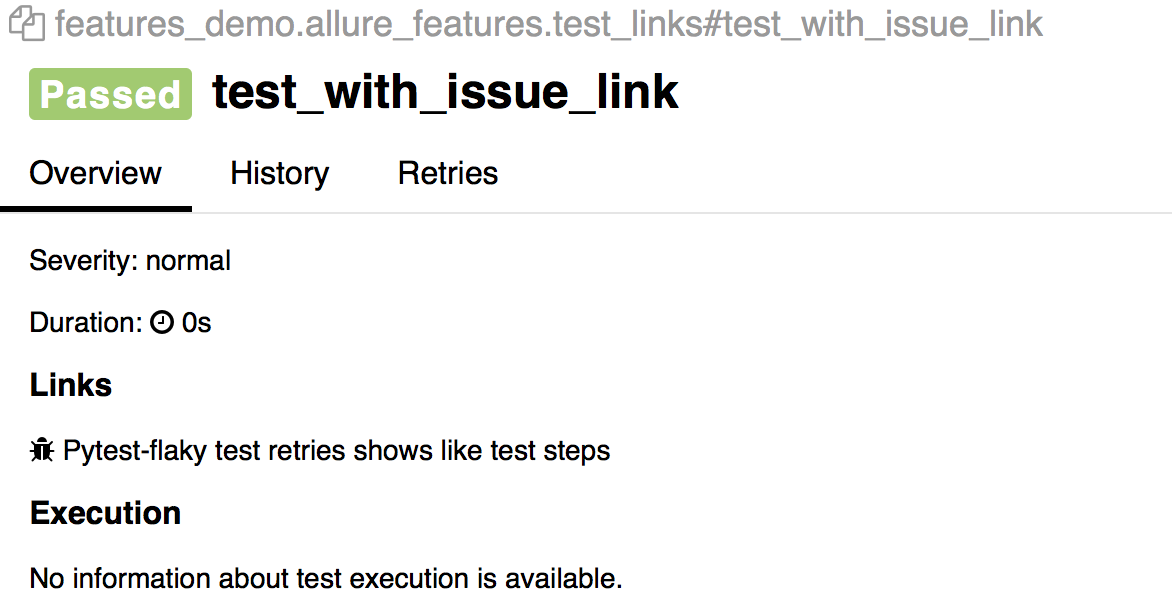
Retries
Allure allows you to aggregate information about test being re-executed during a single test run as well as history of test execution over some period of time.
For retries you can use Pytest rerun failures plugin.
For example if we have a very unreliable step method that fails often, after specifying --reruns=5 in the Pytest startup options we would see all unsuccessful attempts to run this test displayed on the Retries tab.
import allure
import random
import time
@allure.step
def passing_step():
pass
@allure.step
def flaky_broken_step():
if random.randint(1, 5) != 1:
raise Exception('Broken!')
def test_broken_with_randomized_time():
passing_step()
time.sleep(random.randint(1, 3))
flaky_broken_step()import allure
import random
import time
@allure.step
def passing_step():
pass
@allure.step
def flaky_broken_step():
if random.randint(1, 5) != 1:
raise Exception('Broken!')
def test_broken_with_randomized_time():
passing_step()
time.sleep(random.randint(1, 3))
flaky_broken_step()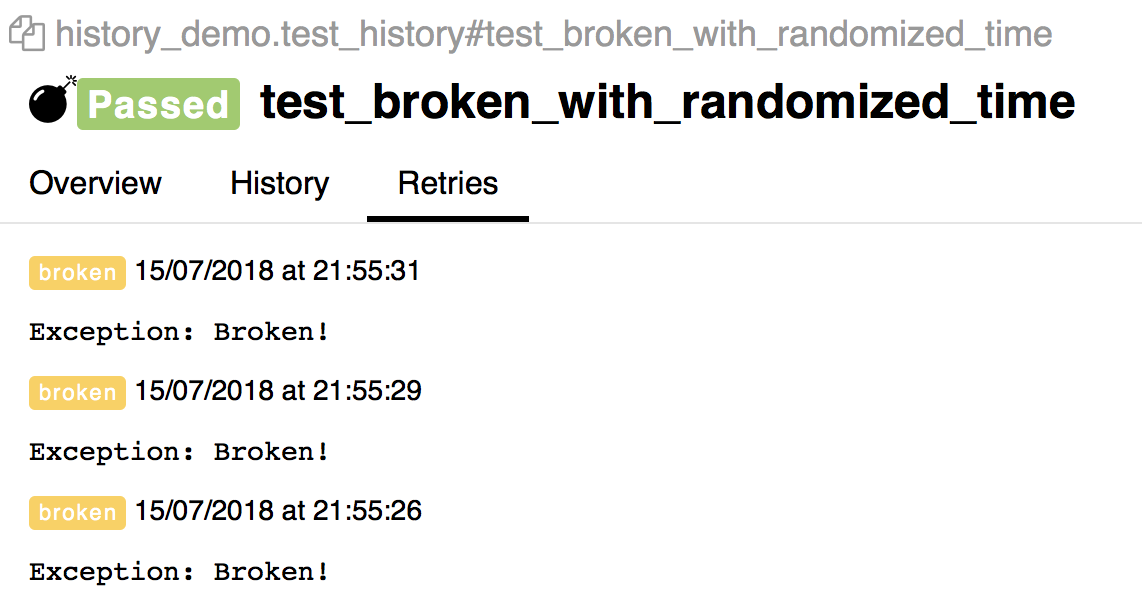
Also such a test would receive 'flaky' bomb icon in the list of executed tests.
![]()
Tags
Sometimes you want to be flexible with tests that you want to be executed. Pytest allows that by using marker decorator @pytest.mark (Pytest docs).
Allure allows to mark your tests in a similar way with 3 types of marking decorators that allow to structure representation of your report:
BDD-style markers denoting Epics, Features and Stories
Severity labels
Custom labels
BDD markers
There are two decorators: @allure.feature and @allure.story to mark your tests according to Feature/Story breakdown specific to your project (for background see BDD article on Wikipedia). To mark that some feature or story belong to an epic, use a name that starts with epic_ prefix.
# tests.py
import allure
def test_without_any_annotations_that_wont_be_executed():
pass
@allure.story('epic_1')
def test_with_epic_1():
pass
@allure.story('story_1')
def test_with_story_1():
pass
@allure.story('story_2')
def test_with_story_2():
pass
@allure.feature('feature_2')
@allure.story('story_2')
def test_with_story_2_and_feature_2():
pass# tests.py
import allure
def test_without_any_annotations_that_wont_be_executed():
pass
@allure.story('epic_1')
def test_with_epic_1():
pass
@allure.story('story_1')
def test_with_story_1():
pass
@allure.story('story_2')
def test_with_story_2():
pass
@allure.feature('feature_2')
@allure.story('story_2')
def test_with_story_2_and_feature_2():
passYou can use following commandline options to specify different sets of tests to execute passing a list of comma-separated values:
--allure-epics--allure-features--allure-stories
for example:
$ pytest tests.py --allure-stories story_1,story_2
collected 5 items
tests.py ... [100%]
============================== 3 passed in 0.01 seconds ==============================$ pytest tests.py --allure-stories story_1,story_2
collected 5 items
tests.py ... [100%]
============================== 3 passed in 0.01 seconds ==============================$ pytest tests.py --allure-features feature2 --allure-stories story2
collected 5 items
tests.py ... [100%]
=============================== 2 passed in 0.01 seconds ==============================$ pytest tests.py --allure-features feature2 --allure-stories story2
collected 5 items
tests.py ... [100%]
=============================== 2 passed in 0.01 seconds ==============================Severity markers
To mark your tests by severity level you can use @allure.severity decorator. It takes a allure.severity_level enum value as an argument.
# tests.py
import allure
def test_with_no_severity_label():
pass
@allure.severity(allure.severity_level.TRIVIAL)
def test_with_trivial_severity():
pass
@allure.severity(allure.severity_level.NORMAL)
def test_with_normal_severity():
pass
@allure.severity(allure.severity_level.NORMAL)
class TestClassWithNormalSeverity(object):
def test_inside_the_normal_severity_test_class(self):
pass
@allure.severity(allure.severity_level.CRITICAL)
def test_inside_the_normal_severity_test_class_with_overriding_critical_severity(self):
pass# tests.py
import allure
def test_with_no_severity_label():
pass
@allure.severity(allure.severity_level.TRIVIAL)
def test_with_trivial_severity():
pass
@allure.severity(allure.severity_level.NORMAL)
def test_with_normal_severity():
pass
@allure.severity(allure.severity_level.NORMAL)
class TestClassWithNormalSeverity(object):
def test_inside_the_normal_severity_test_class(self):
pass
@allure.severity(allure.severity_level.CRITICAL)
def test_inside_the_normal_severity_test_class_with_overriding_critical_severity(self):
passSeverity decorator can be applied to functions, methods or entire classes.
By using --allure-severities commandline option with a list of comma-separated severity levels only tests with corresponding severities will be run.
$ pytest tests.py --allure-severities normal,critical
collected 5 items
bdd_annotations_demo/test_severity_labels.py ... [100%]
================================ 3 passed in 0.01 seconds ============================$ pytest tests.py --allure-severities normal,critical
collected 5 items
bdd_annotations_demo/test_severity_labels.py ... [100%]
================================ 3 passed in 0.01 seconds ============================Behave
Allure integrates with behave as an external formatter.
Instalation
$ pip install allure-behave$ pip install allure-behaveUsage
You can specify the formatter directly in the command line:
$ behave -f allure_behave.formatter:AllureFormatter -o %allure_result_folder% ./features$ behave -f allure_behave.formatter:AllureFormatter -o %allure_result_folder% ./featuresFeatures
Severity
Tags that are matched to severity names (like critical, trivial, etc.) will be interpreted as a feature or scenario severity. Scenario inherits feature severity if not provided, or overrides it in the other case. If there is more than one severity definition tag, only the last one is used.
Steps and Scenarious status
Steps with assertion exceptions will be marked as failed. Other exceptions thrown during the test execution will cause it to have status broken. Scenario status will be determined by the first unsuccessful step status. When all steps are passed, then the whole scenario is considered passed.
Step Data
Step data text or table data are represented as step attachments in report.
Nose
It is a port of pytest-allure-adaptor for nose framework.
Usage
nosetests --with-allure --logdir=/path/to/put/results
nosetests --with-allure --logdir=/path/to/put/results --not-clear-logdirnosetests --with-allure --logdir=/path/to/put/results
nosetests --with-allure --logdir=/path/to/put/results --not-clear-logdirOption "--not-clear-logdir" is useful with option "--processes" to prevent cleaning of logdr at the end of testing.
Supported features
Attachment
To attach some content to test report:
import nose
def test_foo():
nose.allure.attach('my attach', 'Hello, World')import nose
def test_foo():
nose.allure.attach('my attach', 'Hello, World')Step
To divide a test into steps:
import nose
def test_foo():
with nose.allure.step('step one'):
# do stuff
with nose.allure.step('step two'):
# do more stuffimport nose
def test_foo():
with nose.allure.step('step one'):
# do stuff
with nose.allure.step('step two'):
# do more stuffCan also be used as decorators. By default step name is generated from method name:
import nose
@nose.allure.step
def make_test_data_foo():
# do stuff
def test_foo():
assert make_some_data_foo() is not None
@nose.allure.step('make_some_data_foo')
def make_some_data_bar():
# do another stuff
def test_bar():
assert make_some_data_bar() is not Noneimport nose
@nose.allure.step
def make_test_data_foo():
# do stuff
def test_foo():
assert make_some_data_foo() is not None
@nose.allure.step('make_some_data_foo')
def make_some_data_bar():
# do another stuff
def test_bar():
assert make_some_data_bar() is not NoneEnvironment
You can provide test environment parameters such as report name, browser or test server address to allure test report.
import nose
def test_dummy():
nose.allure.environment(report='Allure report', browser=u'Firefox')import nose
def test_dummy():
nose.allure.environment(report='Allure report', browser=u'Firefox')Severity
Any test, class or module can be marked with different severity:
import nose
class TestBar(object):
@nose.allure.severity(nose.allure.severity_level.CRITICAL)
def test_bar(self):
pass
# custom severity
@nose.allure.severity("hard")
def test_bar(self):
passimport nose
class TestBar(object):
@nose.allure.severity(nose.allure.severity_level.CRITICAL)
def test_bar(self):
pass
# custom severity
@nose.allure.severity("hard")
def test_bar(self):
passTo run tests with concrete priority:
nosetests my_tests/ --with-allure --logdir=tmp --severity="critical, hard"nosetests my_tests/ --with-allure --logdir=tmp --severity="critical, hard"Issue
Issues can be set for test.
import nose
@nose.allure.issue('http://jira.lan/browse/ISSUE-1')
def test_foo():
assert Falseimport nose
@nose.allure.issue('http://jira.lan/browse/ISSUE-1')
def test_foo():
assert FalseFeatures & Stories
Feature and Story can be set for test.
import nose
@nose.allure.feature('Feature1')
@nose.allure.story('Story1')
def test_minor():
assert False
class TestBar(object):
@nose.allure.feature('Feature2')
@nose.allure.story('Story1')
def test_bar(self):
passimport nose
@nose.allure.feature('Feature1')
@nose.allure.story('Story1')
def test_minor():
assert False
class TestBar(object):
@nose.allure.feature('Feature2')
@nose.allure.story('Story1')
def test_bar(self):
passTo run tests by Feature or Story:
nosetests my_tests/ --with-allure --logdir=tmp --feature="Feature1, Feature2"
nosetests my_tests/ --with-allure --logdir=tmp --feature="Feature1, Feature2" --story="Story1, Story2"nosetests my_tests/ --with-allure --logdir=tmp --feature="Feature1, Feature2"
nosetests my_tests/ --with-allure --logdir=tmp --feature="Feature1, Feature2" --story="Story1, Story2"